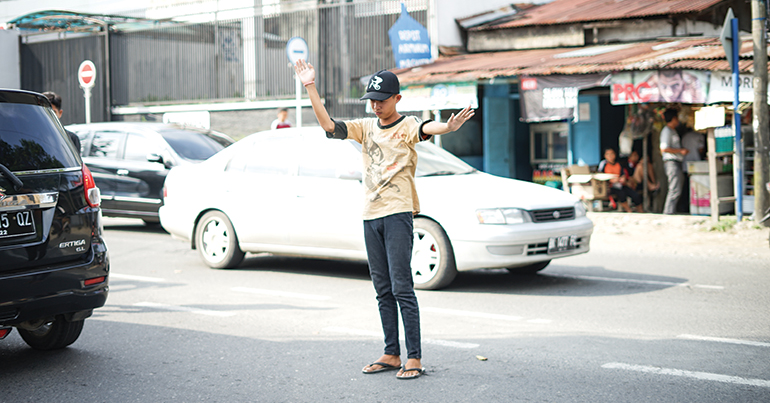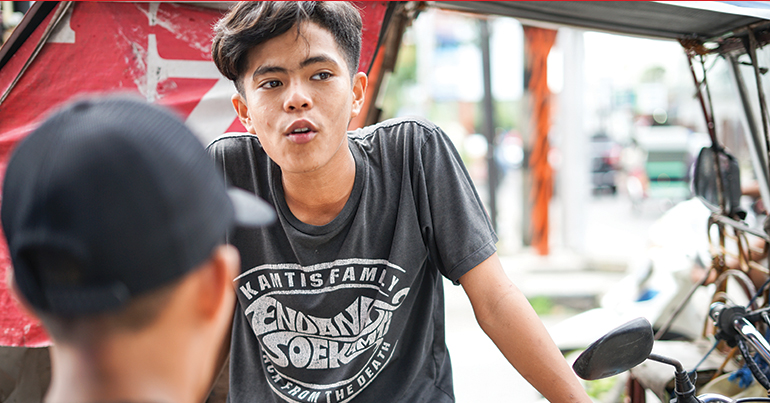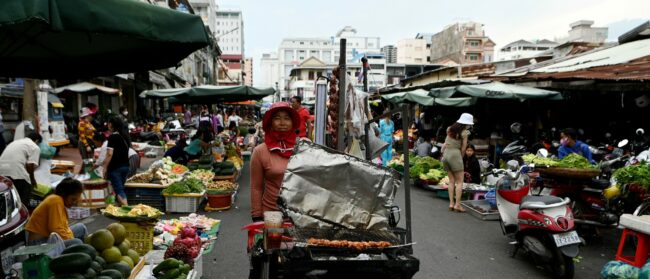Amrir is a human traffic light. Standing at a busy intersection in Medan, Indonesia’s fourth-largest city, he calmly waves drivers across the junction while holding up a hand to stop cars coming the opposite way. The 48-year-old, who like many Indonesians goes by only one name, says he has been making life easier for drivers as a freelance traffic conductor for six years.
In Indonesia, Amrir is known as a pak ogah, a slang term linked to a character in an Indonesian children’s TV show who does odd jobs for cash. As Amrir helps ease traffic snarl-ups, drivers open their windows and hand him money for guiding them safely across the street. Drivers normally pay him between IDR500 ($0.03) and IDR2,000 ($0.14), although not all motorists are kind enough to tip. On average, he makes between IDR20,000 ($1.40) and IDR30,000 ($2.20) per day.
“I became a pak ogah six years ago when I decided to retire from my job as a becak [cycle rickshaw] driver,” Amrir explains. “I was one of the last drivers in Medan to use a bicycle becak instead of a motorised one, and people didn’t want to hire me to drive them around the city anymore as they thought I was too slow.”
Lacking the money to upgrade his becak and fit it with a motorbike, and lacking any other skills or education to secure another job, Amrir teamed up with a group of six other becak drivers. They chose their intersection after realising that, without any traffic lights in place, and with heavy traffic coming from the main road and the side streets, there was a need for traffic guides to help cars navigate the junction. The group decide on their schedules amongst themselves so that everyone has a chance to work and make money every day. Working in shifts, they begin at 8am and continue throughout the day, sometimes until the early hours of the morning. Each man works for about two to three hours per day, seven days a week. Amrir says that his favourite shift is at about 1pm when the roads are at their busiest, with children going home from school, so there is a higher chance of tips.
Pak ogah can be found in cities all over Indonesia, but since they work as freelancers, it is difficult to get an idea of how many there are. According to the Castrol-Magnatec Stop-Start Index, which looks at how many times drivers have to stop and start their cars and how long they idle in traffic, Indonesia is the world’s most traffic-congested country. A number of issues contribute to this congestion, including roads that were built decades ago without traffic lights and are now too narrow for the increasing volume of cars. In addition, Medan, which is located on Sumatra, has boomed on the back of the island’s four million-acre palm oil trade. The city’s population has more than doubled in the past 20 years.
As Tuti Lubis, who works on town planning initiatives in Medan, explains: “There are so many new buildings in Medan, as well as an increase in the number of cars, which the roads are just not designed to deal with. Add this to the character of drivers in Medan, who are known for being extremely impatient, and you see why there is a need for people like pak ogah.”
These informal traffic guides feed the need for order on Indonesia’s congested streets, but they are also a product of the country’s strong freelance economy. According to data from the World Bank, some 53% of Indonesian workers are self-employed. The bank’s data also shows that the unemployment rate is about 5.5% of the labour force, or 7.2 million people in a country with a population of 261 million. For those such as Amrir who can’t get a formal job, there is a need to be resourceful.

Although pak ogah are trying to help the traffic situation in Indonesia, not everyone is impressed by their work. According to Gani, who also goes by only one name, and is a motorised becak driver who works on Jalan Polonia with Amrir, pak ogah have a difficult reputation in Indonesia.
“People sometimes say that pak ogah are thugs or criminals. They think they are lazy and can’t be bothered to get a real job, even though this kind of work is tiring and can be dangerous,” he says.
Indeed, working as a pak ogah is not for the faint-hearted, and it comes with risks, from breathing exhaust fumes to standing in the sun for hours on end. While Amrir says he has never been hit by a car, another pak ogah named Kino, 17, who also goes by only one name, almost had his leg broken recently when a Go-Jek (motorbike taxi) driver ploughed into him.
“I was standing in the street directing the traffic, but he didn’t pay attention to my hand signals telling him to stop. He just ran into me. It felt like my leg had been shattered,” Kino says.
Kino finished school when he was 16 and struggled to find a job in Medan. He now works on Jalan Monginsidi at another busy junction. As a freelancer, and like the majority of pak ogah, he doesn’t have insurance. When Kino was hit, the Go-Jek driver took him to a nearby hospital and paid for treatment.
Kino works with another traffic guide called Yuda, who is 16 and also goes by one name. He is in his final year of school, and the two have been friends since they were young. Yuda says he earns up to IDR30,000 ($2.20) for a three-hour shift and spends it on “treats”, mainly fizzy drinks.
Although working as a pak ogah is considered ‘unskilled’ work, it is not easy. Pak ogah receive no training, which means that depending on their own skill levels, they can sometimes make the traffic situation worse or suffer injuries.
As Lubis explains: “Pak ogah are often pushed into this kind of work because they need money. They don’t necessarily help the traffic situation in that case, and they can make it worse if they can’t work out how to fairly give priority to cars coming from different directions. For pak ogah to be effective we need to see official plans in place for recruitment and for training of set traffic rules.”

Due to the lack of regulations concerning the legality of pak ogah, they are often picked up by the police. Yuda and Kuno have each been arrested twice and, according to Yuda, they were taken to the police station and questioned.
“They asked us why we worked on the streets and took all the money we had made that day out of our pockets. Then they just told us not to work as pak ogah ever again,” Yuda says. “They didn’t put us in a cell or anything, so we just went back to work the next day.”
Amrir has been picked up three times. He says the police have told him they don’t like the fact he wears a high-visibility jacket, which they think makes him look like he is working in an official capacity. He finds the raids frustrating, because he feels he is providing a much-needed service, even though he knows that some people accuse pak ogah of causing longer traffic jams.
“The most important thing to me is that I am working and trying to make money doing something that helps people,” he says with a shrug.
Despite their somewhat tense relationship with the police, pak ogah may benefit from a range of initiatives the government is exploring to help traffic guides make the leap from informal workers to salaried professionals. One such initiative was conceived by Jakarta traffic police director Halim Pagarra, who discussed it with Merdeka newspaper in June 2017.
“We will call them ‘Supertas’… they will work with us as part of a programme that we are discussing. Later they will be given official uniforms,” Pagarra said in the interview, using the term abbreviated from sukarelawan pengatur lalu lintas, which means traffic regulator volunteer.
There are similar plans underway in Medan, and Medan Traffic Corps chief Indra Warman announced in August 2017 that pak ogah would be trained by the local police on how to guide the traffic more effectively.
“We support this plan. It would be very positive if the pak ogah become volunteers. At the moment a lot of pak ogah actually exacerbate the traffic situation. If they are trained, however, the traffic police’s duties will be lighter,” added Renward Parapat, head of the Medan Transportation Agency, according to Tribun Medan newspaper in August 2017.
If schemes like this materialise, they should help pak ogah – who risk life and limb to deal with Indonesia’s chronic traffic problem – reap benefits. Besides having salaried jobs, they would receive training to better ensure their safety and help them guide traffic more effectively. But the government has yet to approach pak ogah such as Amrir, and he says he has received no instructions from the authorities on how to sign up to become a licensed traffic guide.
Asked if he would like to work as part of a government scheme, which would make pak ogah an official job in Medan, Amrir nods his head and spreads his hands wide. “Sure,” he says. “I’d love that job. Where is it?”


